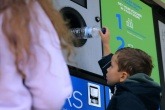BMRA calls on Government to support transition to electric balers
The British Metals Recycling Association presents the government with reform proposals to strengthen industry's contribution to net zero goals while addressing operational challenges.
 The British Metals Recycling Association (BMRA) has urged the UK government to improve business conditions for metal recyclers, emphasising the sector's crucial role in achieving the country's 2050 net zero targets.
The British Metals Recycling Association (BMRA) has urged the UK government to improve business conditions for metal recyclers, emphasising the sector's crucial role in achieving the country's 2050 net zero targets.
In its newly published ‘Agenda for Change’, presented to MPs at a parliamentary dinner, the BMRA outlined several key policy requests aimed at enabling the industry to operate more efficiently and sustainably.
"Given recycling's prominence in achieving net zero goals, and metals' 100 per cent recyclability, the Government needs a strong metals recycling industry. It will benefit the country to move forward and reach its 2050 targets," said James Kelly, BMRA's CEO.
Making the future of UK metal recycling more energy efficient
The BMRA's proposals include maintaining unrestricted metal exports, noting that even after supplying UK steelmakers' full requirements, the country would still have a 4 million tonne surplus of scrap metal. Currently, the UK exports 70 to 80 per cent of its annual 11.5 million tonnes of scrap metal.
The association calls for the implementation of the British Industry Supercharger to reduce energy costs. According to the BMRA, switching from diesel to electric balers could reduce CO2 emissions by 49 per cent, but requires more affordable electricity rates.
Other key requests include establishing additional treatment facilities for hazardous materials whilst encouraging eco-design to design out harmful substances, introducing kerbside collections for batteries and small electrical items to reduce fire risks, and implementing minimum recycled content requirements for public infrastructure projects.
According to Material Focus, battery fires have increased by 71 per cent, rising from 700 in 2022 to over 1,200 in the last year.
The organisation also suggests a variable-rate deposit return scheme to encourage the use of fully recyclable metal over plastic, warning that a flat-rate scheme could result in 826 million additional plastic bottles being produced.
The environmental benefits of this investment would further benefit the government, according to the BMRA. Each tonne of recycled steel can save 1.5 tonnes of carbon dioxide, as well as reduce energy consumption and water usage.
Kelly added: “Metals recycling’s evidential impact on sustainability and climate is clear, it lowers CO₂ and helps preserve natural habitats by reducing the need for primary extraction and raw materials. BMRA’s calls on the Government are simple and clear, strongly consider the UK metals recycling industry’s impact to your own ambitions.”







